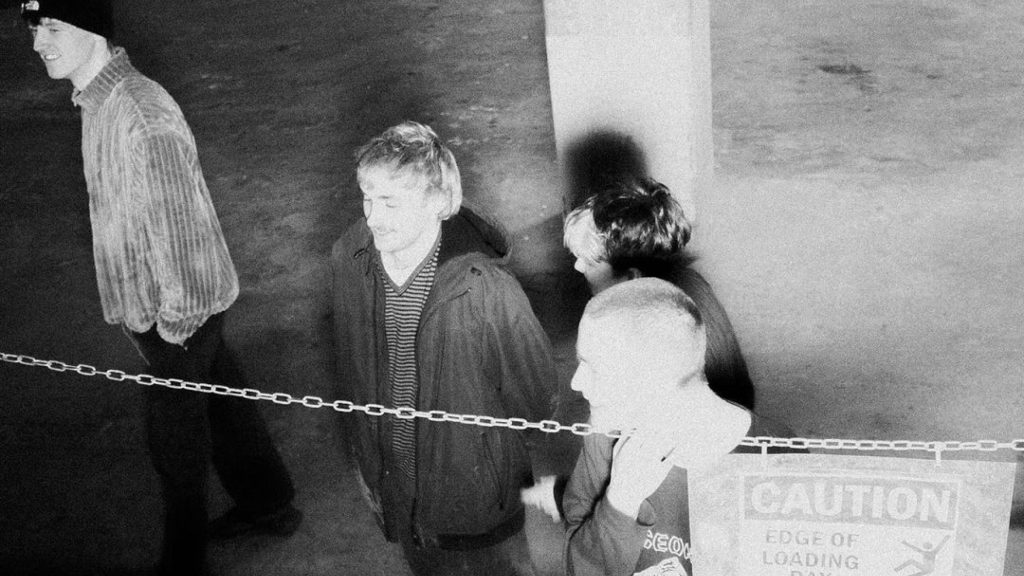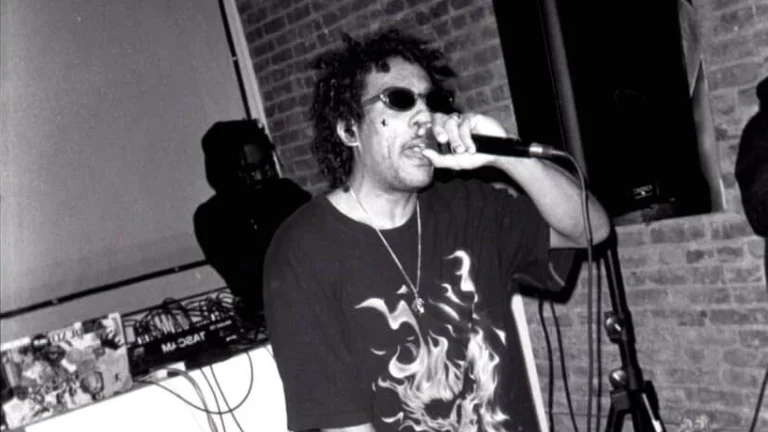London has always been at the top of the live punk scene, pumping out unruly youths by the dozens. Emerging Behaviour is another to emerge from this “primordial sonic ooze,” as described in their Spotify introduction. Although the raucous band is known for their live performances, 2024 welcomed their first recorded album. GILT! covers various social issues, from religion to war, in a sardonic and discontent tongue.
“Charlie’s Riff” begins the collection with uneasy instrumentals that come together underneath the commanding voice of Eli, their lead vocalist. The guitars are constantly on the verge of a whine, as if they’re itching to play full out; dogs waiting to be let off their leash. The lyrics for me, at least, are hard to make out from the distressed guitar squeals, turning the titular riff into the track’s focus. But the next eldritch track, “And God Said…” is accompanied by a lyric video—for good reason, too. The gilded font tells the story of a previously unassuming town, living with a cosmic horror in their mountains. The gothic instruments are even and repetitive, an unbiased Greek chorus repeating the story like a folktale. God here seems to be the cosmic horror in question, put there by the “frightened men” in charge of the town. Their actions appear less than holy, though, turning God into something to be feared, and each chorus ends with the pessimistic line “Even the devil lives by cause and effect.” The song takes on religion and the humans who twist it to their whims, presenting a grim outcome of these men who abuse their power.
“Stressor,” too, takes on those in positions of power. The bleak track pays homage to Pink Floyd with allusions to a rigid educational system and restless instrumentals. In this song, though, you can feel a physical stressor on the music, taking on the pain of the vocalist. The breathy lyrics taunt the listener and the song’s subject alike, hissing nothing more than “stress” in the track’s final moments—a representation of educational pressures.
Similarly unnerving, “Critical Mass” continues GILT!’s haunting tone with a simple guitar line. Lyrics sway back and forth before the song reaches its own critical mass, erupting into a scream and a new vocalist who urges you to “Slip a lightbulb in your mouth.” This iconically is an unsolvable situation as the bulb’s bulbous part is too large to be removed from a mouth. The song drops back into the opening riff, the original singer’s voice distorted in the face of something so imposing.
“War Song” takes the same approach to its climaxing melody, though in a much more traditionally punk way. While in other songs the guitars particularly take on a storytelling role, here they serve mainly as noise—unforgiving and hard-edged. The thrashing build of instrumentals here that, in live shows, would encourage a lively pit, is a perfect parallel to the chaos of a warzone. The music’s violent atmosphere, particularly with the echoing vocals, only enhances this.
The next track, “Misery Was,” with its feedback screech at the beginning, makes listeners believe something loud is about to come. But, instead, its longer runtime stays lowkey, primarily narrated by the guest singer on other tracks. This makes the resulting content all the more chilling. He rambles on about dreams and nightmares of his, ending with an unconvincing refrain of “This is not a suicide note.” The monologue sounds like memories flashing through someone’s mind before an inevitable death, the song itself serves as said note.
A more tongue-in-cheek take on the defeatism of this album is “The Future’s in Colour!,” an upbeat chant about the world’s fate. Seemingly every band member joins in on vocals here, admitting just how little they know; least of all about what they’re doing with their lives. Shouting above the percussive instrumentals, they declare that while everything may seem hopeless, at least “the future’s in color!”
“Paracetamol” is the final unsettling song on GILT! and the only one with an official music video. The title comes from the alternate name for acetaminophen, a common painkiller. The song references over-the-counter pill addictions while static-y videos of the band performing live play, intercut with footage of doll heads, decked out in gaudy jewelry and makeup. In a world as grim as the prior songs detail, this song sympathizes with people who look to numb the pain via any means necessary. The video’s final image is a mannequin head with its back to the camera, laid sidewise. In the most cynical view, the album ends on an image of overdose and death, with little escape.
In the aforementioned Spotify description, the band recognizes their “emotionally sterile” nature, but this only adds to the harsh message of their music—a sort of discordant alternative with brooding always at the forefront. It’s a sterile, unforgiving ending for, through their eyes, a sterile and unforgiving world.





